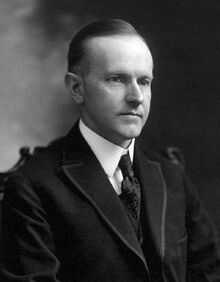President Calvin Coolidge[]
John Calvin Coolidge Jr. (1872 – January 5, 1933) was the 11th President of the United States (1923–33). A

New Federalist lawyer from Vermont, Coolidge worked his way up the ladder of Massachusetts state politics, eventually becoming governor of that state. His response to the Boston Police Strike of 1919 thrust him into the national spotlight and gave him a reputation as a man of decisive action. Soon after, he was elected as the 7th vice president in 1922 and succeeded to the presidency upon the sudden death of Warren G. Harding in 1923. Elected in his own right in 1924, he gained a reputation as a small-government conservative, and also as a man who said very little, although having a rather dry sense of humor. Coolidge restored public confidence in the White House after the scandals of his predecessor's administration, and left office with considerable popularity. As a Coolidge biographer wrote, "He embodied the spirit and hopes of the middle class, could interpret their longings and express their opinions. That he did represent the genius of the average is the most convincing proof of his strength." Coolidge died at the age of 60 in January 1933, less than two months before his immediate successor, Herbert Hoover, left office.
Presidency[]
Calvin Coolidge enjoyed a highly successful presidency, especially considering the poor approval rating of the previous administration. Coolidge gained popularity among conservatives for his dedication to a smaller government and thus, was able to pull off a victory in the traditional democratic strongholds of Florida and Virginia. Coolidge's presidency is looked upon historically as a turning point where the New Federalist party became the major Conservative party in the C.S and the Democratic party became more liberal.